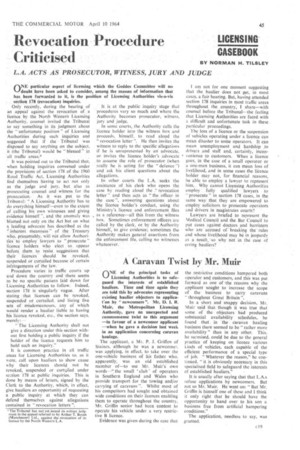Revocation Procedure LICENSING
Page 47

If you've noticed an error in this article please click here to report it so we can fix it.
Criticised
BY NORMAN H. T1LSLEY
L.A. ACTS AS PROSECUTOR WITNESS, JURY AND JUDGE
• ONE. particular aspect of licensing
‘-fdoubt have been asked to consider, has. been forwarded to it, is the posi section 178 (revocation) inquiries.
Only recently, during the hearing of an appeal against the revocation of, a licence by the North Western Licensing Authority, counsel invited the Tribunal to say' something in its judgment about the "unfortunate position" of Licensing Authorities during such inquiries and suggested that if the Tribunal was disposed to say anything on the subject, it (the Tribunal) would be " blessed" in all traffic areas.* It was pointed out to the Tribunal that. when holding inquiries convened under the provisions of section 178 of the 1960
• Road .Traffic Act, Licensing Authorities find themselves having to act not only as •the judge and jury, but also as prosecuting counsel and witnesa for the prosecution. As it was put to the Tribunal: "A Licensing Authority has to do everything himself—even to the extent of calling his own witnesses and giving evidence himself ", and the anomaly was 'blame-a not only on the Act but on what a leading advocate has described as the " inherent meanness " of the Treasury who presumably will not allow Authorities to employ lawyers to "prosecute " licence holders who elect to appear before them to resist Suggestions that their licences should be revoked, Suspended or curtailed because of certain infringements of the law. Procedure varies in traffic courts up and down the country and there seems to be no specific pattern laid down for Licensing Authorities to follow. Indeed. section 178 is singularly vague. After stating that licences can be revoked, sUspended or, curtailed, and listing five sets ofm'isdem'eanours, any of whichwould render a haulier liable to having his licence revoked, etc., the section says, merely:—
The Licensing Authority shall not give a direction under this section without first holding a public inquiry if the holder of the licence requests him to hold such an inquiry."
It is common practice in all traffic areas for Licensing Authorities to, as it were, call upon hauliers to show cause why their licences should not be revoked, suspended or curbliled under section 178 at public inquiries. This is done by means of letters, signed by the Clerk to the Authority, which, in effect, give hauliers an opportunity of requesting a public inquiry at which they can defend themselves against allegations contained in "revocation letters ". which the Geddes Committee will no among the masses of information that tion of Licensing Authorities vis-a-vis It is at the public inquiry stage that 'procedures vary so, much and where the Authority becomes prosecutor, witness. jury and judge.
In some courts, the Authority calls the licence holder into the witness box and proceeds, himself, to read aloud the " revocation letter ". He then invites the witness to reply to the specific allegations if he is unrepresented by an advocate, or invites the licence holder's advi)cate to assume the role of prosecutor (when really he is acting for the " defence ") and ask his client questions about the allegations.
In other courts the L.A. seeks the assistance of his clerk who opens the case by reading aloud the " revocation letter and then acts as " the officer in the case ", answering questions about the licence holder's conduct, using the Ministry's licence and enforcement files as a reference—all this from the witness box, Sometimes enforcement officers arc called by the clerk, or by the Authority himself, to give evidence; sometimes the• Authority makes general assertions from the enforcement file, calling no Witnesses whatsoever.' I am not for one moment suggesting that the haulier does not get, in most cases, a fair hearing. But, having attended section 178 inquiries in most traffic areas throughout the country, I share—with counsel before the Tribunal—the feeling that Licensing Authorities are faced with a difficult and unfortunate task in these particular proceedings.
'the loss of a licence or the suspension of vehicles operating under a licence can mean disaster to some operators. It can mean unemployment and hardship .to drivers and staff and, certainly, incon • venience to customers. When a licence goes, in the case of a small operator or a one-man business, it can mean loss of livelihood, and in some cases the lieence holder may not, for financial reasons, he able to employ a lawyer to represent hint., Why cannot Licensing Authorities employ fully qualified lawyers to prosecute" in section 178 cases, in the same way' that, they are empowered to employ solicitors to prosecute operators and drivers in magistrates courts?
Lawyers are briefed to represent the Medical Council and the Bar Council to put cases against doctors and barristers who are accused of breaking the rules and whose livelihood may be in jeopardy as a -result, so why not in the case of erring hauliers?
























































































































